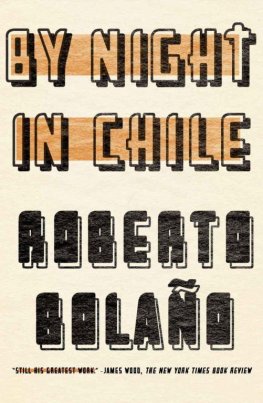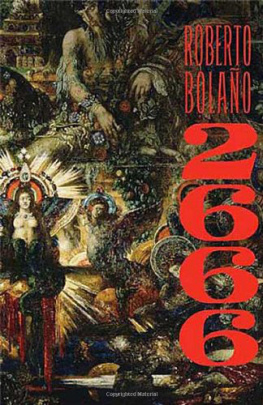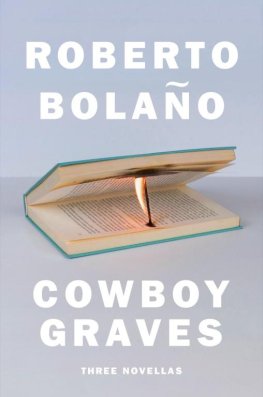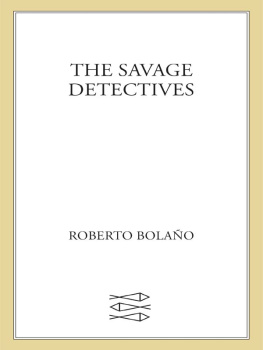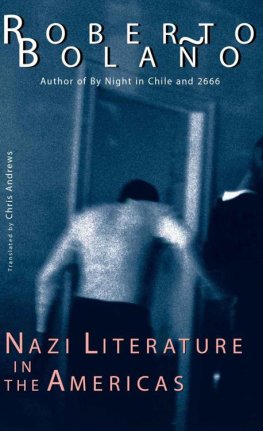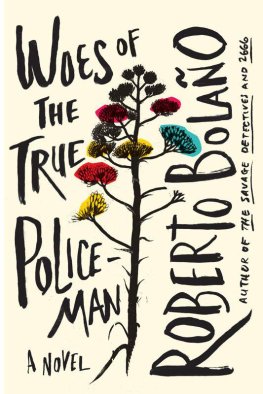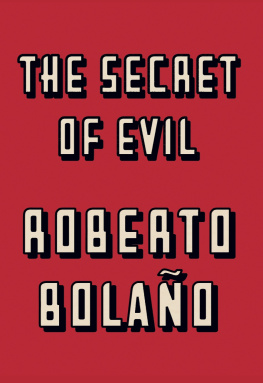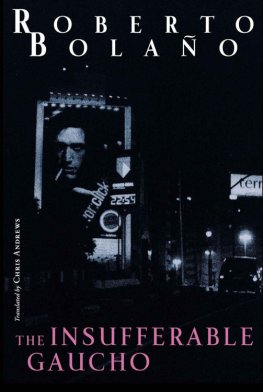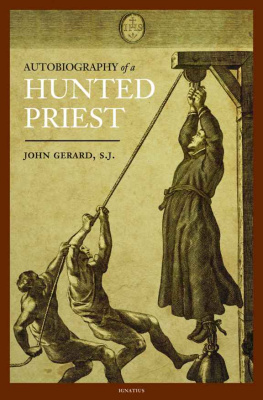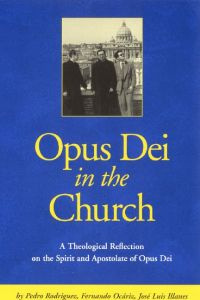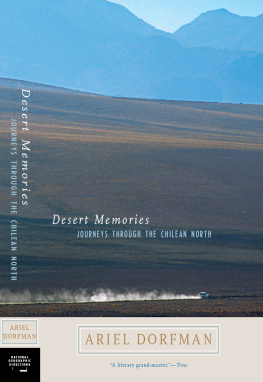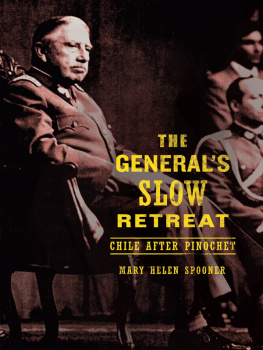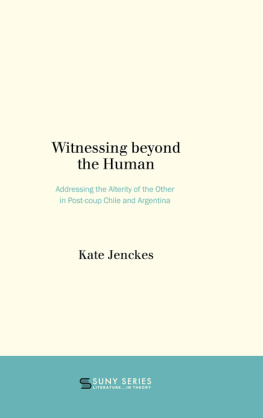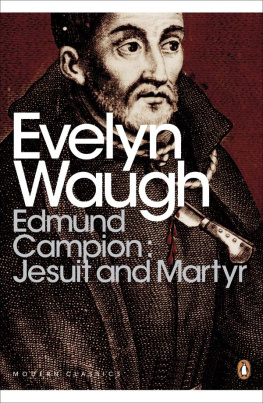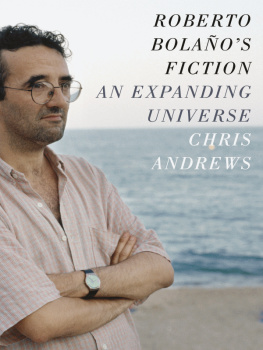Roberto Bolao
BY NIGHT IN CHILE
Translated by Chris Andrews
for Carolina Lpez and Lautaro Bolao
Take off your wig.
CHESTERTON
I AM DYING NOW, but I still have many things to say. I used to be at peace with myself. Quiet and at peace.
But it all blew up unexpectedly. That wizened youth is to blame. I was at peace.
I am no longer at peace. There are a couple of points that have to be cleared up. So, propped up on one elbow, I will lift my noble, trembling head, and rummage through my memories to turn up the deeds that shall vindicate me and belie the slanderous rumors the wizened youth spread in a single stormlit night to sully my name. Or so he intended. One has to be responsible, as I have always said. One has a moral obligation to take responsibility for ones actions, and that includes ones words and silences, yes, ones silences, because silences rise to heaven too, and God hears them, and only God understands and judges them, so one must be very careful with ones silences. I am responsible in every way. My silences are immaculate. Let me make that clear. Clear to God above all.
The rest I can forgo. But not God. I dont know how I got on to this. Sometimes I find myself propped up on one elbow, rambling on and dreaming and trying to make peace with myself. But sometimes I even forget my own name. My name is Sebastin Urrutia Lacroix. I am Chilean. My ancestors on my fathers side came from the Basque country, or Euskadi, as it is now called. On my mothers side I hail from the gentle land of France, from a village whose name means Man on the Earth or perhaps Standing Man, my French is failing me as the end draws near.
But I still have strength enough to remember and rebut the wizened youths affronts, flung in my face one day, when without the slightest provocation and quite out of the blue, he appeared at the door of my house and insulted me. Let me make that clear. My aim is not to stir up conflict, it never has been, my aims are peace and responsibility for ones actions, for ones words and silences. I am a reasonable man. I have always been a reasonable man. At the age of thirteen I heard Gods call and decided to enter a seminary. My father was opposed to the idea. He was not absolutely inflexible, but he was opposed to the idea. I can still remember his shadow slipping from room to room in our house, as if it were the shadow of a weasel or an eel. And I remember, I dont know how, but the fact is that I do remember my smile in the midst of the darkness, the smile of the child I was. And I remember a hunting scene on a tapestry. And a metal dish on which a meal was depicted with all the appropriate decorations.
My smile and my trembling. And a year later, at the age of fourteen, I entered the seminary, and when I came out again, much later on, my mother kissed my hand and called me Father or I thought I heard her say Father, and when, in my astonishment, I protested, saying Dont call me Father, mother, I am your son, or maybe I didnt say Your son but The son, she began to cry or weep and then I thought, or maybe the thought has only occurred to me now, that life is a succession of misunderstandings, leading us on to the final truth, the only truth. And a little earlier or a little later, that is to say a few days before being ordained a priest or a couple of days after taking holy vows, I met Farewell, the famous Farewell, I dont remember exactly where, probably at his house, I did go to his house, although maybe I made the pilgrimage to the newspapers editorial offices or perhaps I saw him for the first time at his club, one melancholy afternoon, like so many April afternoons in Santiago, although in my soul birds were singing and buds were bursting into flower, as the poet says, and there was Farewell, tall, a meter and eighty centimeters, although he seemed two meters tall to me, wearing a gray suit of fine English cloth, handmade shoes, a silk tie, a white shirt as immaculate as my hopes, gold cuff links, a tiepin bearing insignia I did not wish to interpret but whose meaning by no means escaped me, and Farewell invited me to sit down beside him, very close, or perhaps before that he took me into his library or the library of the club, and while we looked over the spines of the books he began to clear his throat, and while he was clearing his throat he may have been watching me out of the corner of his eye, although I cant be sure, since I kept my eyes fixed on the books, and then he said something I didnt understand or something my memory has not retained, and after that we sat down again, he in a Chesterfield, I on a chair, and we talked about the books whose spines we had been looking at and caressing, my young fingers fresh from the seminary, Farewells thick fingers already rather crooked, not surprisingly given his age and his height, and we spoke about the books and the authors of the books, and Farewells voice was like the voice of a large bird of prey soaring over rivers and mountains and valleys and ravines, never at a loss for the appropriate expression, the sentence that fitted his thought like a glove, and when with the navet of a fledgling, I said that I wanted to be a literary critic, that I wanted to follow in his footsteps, that for me nothing on earth could be more fulfilling than to read, and to present the results of my reading in good prose, when I said that, Farewell smiled and put his hand on my shoulder (a hand that felt as heavy as if it were encased in an iron gauntlet or heavier still) and he met my gaze and said it was not an easy path. In this barbaric country, the critics path, he said, is not strewn with roses. In this country of estate owners, he said, literature is an oddity and nobody values knowing how to read. And since, in my timidity, I did not reply, he brought his face closer to mine and asked if something had upset or offended me. Perhaps you have an estate or your father does? No, I said. Well, I do, said Farewell, I have an estate near Chilln, with a little vineyard that produces quite passable wine. And without further ado he invited me to spend the following weekend at his estate, which was named after one of Huysmanss books, I cant remember which one now, maybe Rebours or L -bas, perhaps it was even called LOblat, my memory is failing me, I think it was called L -bas, and that was the name of the wine as well, and after issuing this invitation Farewell fell silent although his blue eyes remained fixed on mine, and I was silent too and, unable to meet Farewells penetrating gaze, I modestly lowered my eyes, like a wounded fledgling, and imagined that estate where the critics path was indeed strewn with roses, where knowing how to read was valued, and where taste was more important than practical necessities and obligations, and then I looked up again and my seminarists eyes met Farewells falcon eyes and I said yes, several times, I said yes I would go, it would be an honor to spend the weekend at the estate of Chiles greatest literary critic.
And when the appointed day arrived, my soul was a welter of confusion and uncertainty, I didnt know what clothes to wear, a cassock or laymans clothes: if I opted for laymans clothes, I didnt know which to choose, and if I opted for the cassock, I was worried about making the wrong impression. Nor did I know what books to take for the train journey there and back, perhaps a History of Italy for the outward journey, perhaps Farewells Anthology of Chilean Poetry for the return journey. Or maybe the other way round.
And I didnt know which writers (Farewell always invited writers to his estate) I might meet at L -bas, perhaps the poet Uribarrena, author of splendid sonnets on religious themes, perhaps Montoya Eyzaguirre, a fine and concise prose stylist, perhaps Baldomero Lizamendi Errzuriz, the celebrated and orotund historian. All three were friends of Farewell. But given the number of Farewells friends and enemies speculation was idle. When the appointed day arrived, my heart was heavy as I felt the train pull out of the station, but at the same time I was ready to swallow whatever bitter draughts God in his wisdom had prepared for me. I remember as clearly as if it were today (indeed more clearly still) the Chilean countryside and the Chilean cows with their black splotches (or white ones, depending) grazing beside the railway lines. From time to time the clickety-clack of the train set me dozing. I shut my eyes. I shut them as I am shutting them now. But then I opened them again suddenly, and there before me was the landscape: varied, rich, exultant and melancholy by turns.

